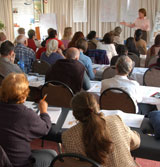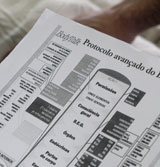Are We Really Different?
Printed from http://www.bodytalksystem.com//learn/news/article.cfm?id=714 on Apr 19, 2024.
Jan 06, 2016
By Terryann Nikides
Each time I travel to a new country I am filled with the sensual pleasures of new languages, the smells in the streets, the brilliant sights and sounds. Everyone looks and dresses differently. Unabashedly, Brazilians expose cleavages and bundas (their behinds) but won't be seen naked. The East Indians do not expose their ankles, but their midriffs are displayed. Tibetans eat meat, but Hindus do not. The Greeks swing their heads down and up to mean no and left to right to mean yes. In Rio de Janeiro students are late; in the UK everyone is in their seat before the start of class. Greeks and Brazilians talk during class. The expats in Hong Kong text message during class. What embarrasses one culture or nation does not embarrass another. We use different expressions, we look different, and we act differently. But are we truly different?
So far, in every country I have visited, students exclaim, "Terry you are not Brazilian (or Chinese, American, Italian, British, Indian, or whatever nationality of wherever I am), so you do not understand!" When I arrived in Greece to teach, students exclaimed, "Terry, you understand because you are Greek!" Yet I am Canadian, not Greek.
Culture creates the illusion of being special. We say that we want to experience oneness and join groups, cultures, and religions that we feel understand us, unify us, and support us. We make mass cultural assumptions that we think are fundamental truths that separate and divide us. "I am different from you because I have a different God I pray to."
These divisive attitudes stem from our insecurities and the need to assuage them. What do we truly need as humans? We might say peace, love, money, work, friends, but in the end, we yearn to feel secure in life and in ourselves.
And so often this need for security through cultural unification leads us to adopt an us-against-them kind of thinking. We feel we are unified with people because we have a common enemy. But all this does is to take us even further from seeing our human commonalities. The beauty of culture gets lost behind an array of defenses that create a chasm between the very humanness that truly unifies us.
Paradoxically, though, even as we flaunt our cultural identity, we still feel alone and separate as though no one understands us. We try to use our cultural identity to bring ourselves together with other people. We flaunt our cultural beliefs like peacock feathers. But this is inherently selective; we can only attract other peacocks. We end up only shielding ourselves from seeing our common humanness.
Once a student experiences the work of BreakThrough though, everyone relates!
BreakThrough is the warm butter knife that melts our
arrogance and reveals the intimate connection between humans.
When we reach
deep inside ourselves and reveal the vulnerable tender parts of self, we see the
communalities that all humans possess. Despite blaming our childhoods, parents,
culture, Gods, idols, politicians, money, and bodies we find that we are all
truly one and the same. Common hurts and insecurities are at the very heart of
compassion. We may dress ourselves up differently but take off the job,
clothing, and money, what is left then, when there is nothing protecting us on
the outside? All that is left is
you; the self that is vulnerable, open, and unprotected by false identities,
and free.
In every culture I have visited, each time I begin a BreakThrough class, the students use every defense, from clothing to ideologies, to protect their ego selves. But by the time the class ends, faces shine in surprise at how similar we all are.
Once an Indian student proclaimed that none of the other students would be able to understand her dilemma because she is Indian. By the end of the first BreakThough she could only utter, "But how is it possible? How do you feel the same as I do? You have the same feelings as I have?"
In another class two students, who were teachers of another course, brought out the heavy artillery to prove they were right. One of them kept nudging the other during the first hours of class saying, "Get her now!" while the other tossed out one rigid assumption after another. When finally she experienced her BreakThrough, I watched her face soften and her eyes light up as her defenses come down until she finally exclaimed, "This is it! It is amazing! This is the missing piece." My heart filled with joy as she understood that we were doing the same work but from a different perspective.
BreakThrough does challenge us. It challenges us to have compassion. It challenges us to come from the heart. It challenges us to stop victimizing. It challenges us empathize and empower ourselves. It challenges us to stop feeling guilty and take responsibility for our selves and our lives. It challenges us to be free. It challenges us to have an adventure and explore an undiscovered country--ourselves.








